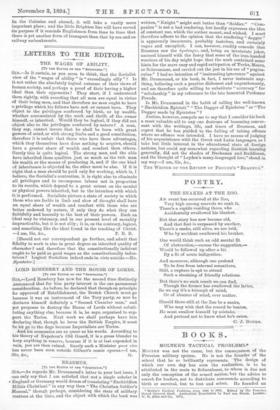ERAS MUS.
[To THE EDITOR OF TIM SPECTATOR."' SIR,—As regards Mr. Drummond's letter in your last issue, oan only say that I am satisfied that not a single scholar in
• England or Germany would dream of translating "Enchiridion Militia Christiani " in any way than "The Christian Soldier's Manual," though perhaps, considering the state of military matters at the time, and the object with which the book was
written, " Knight " might suit better than "Soldier." "Com- panion" is not a bad rendering, but hardly expresses the idea of constant use, which the author meant, and wished. I must therefore adhere to the opinion that the rendering" dagger" is apparently inaccurate, probably tasteless, and certainly vague and unexplicit. I can, however, readily concede that Erasmus saw the eguivoque, and, being an inveterate joker, amused himself with the fancy that some of the iron-handed warriors of his day might hope that the work contained some hints for the more easy and rapid extirpation of Turks, Moors, or Selavonians, and carried out the jest in his use of " pugius- culus." I had no intention of "insinuating ignorance " against Mr. Drummond, or his book, in fact, I never insinuate any- thing, believing such a practice dishonest and ungentlemanly, and am therefore quite willing to substitute " accuracy " for " scholarship " in my reference to the late lamented Professor Froude.
Is Mr. Drummond in the habit of calling the well-known " Enchiridion Epicteti" "The Dagger of Epictetus " or "The Dagger made by Epietetus "P
Justice, however, compels me to say that I consider his book a most valuable aid to any one desirons of becoming conver- sant with the writings, life, and times of Erasmus, and regret that he has yielded to the failing of taking offence where no offence was intended. I have no means of judging of his acquaintance with the Greek and Latin languages, as I take but little interest in the educational state of foreign nations, but could say somewhat regarding Scottish learning generally, did not the shades of Buchanan and Ruddiman, and the thought of "Leyden's many-languaged lore," stand in my way.—I am, Sir, &O., THE WRITER OF THE REVIEW OF FROUDE'S "ERASMUS."


















































 Previous page
Previous page